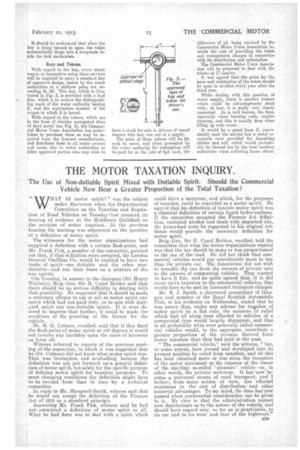THE MOTOR TAXATION INQUIRY.
Page 25

If you've noticed an error in this article please click here to report it so we can fix it.
The Use of Non-dutiable Spirit Mixed with Dutiable Spirit. Should the Commercial Vehicle Now Bear a Greater Proportion of the Total Taxation ?
HAT 15 motor spirit?" was the subject under discussion when the Departmental
Committee on the Taxation and Regulation of Road Vehicles on Tuesday .last resumed its hearing of evidence at the Middlesex Guildhall on the revision of motor taxation. At the previous hearing the meeting was adjourned on the question of a definition of motor spirit.
The witnesses for the motor organizations bad supplied a definition with a certain hash-point, and Mr, Frank Pick, a member of the committee, pointed out that, if that dc,finition were accepted, the London General Oral:ails Co. would be enabled to have two :tanks of spirit—one dutiable and the other nondutiable—and run their buses on a mixture of the
two spirits. •
Tuesday, in answer to the chairman (Sir Henry Maybury), Brig.-Oen. Sir H. Capel Holden said that there should be no serious difficulty in dealing with that possibility. He suggested that it should be made a statutory offence to use or sell as motor spirit any spirit which had not paid duty, or to mix with dutypaid spirit any non-dutiable spirit,. If it were desired to impress that further, it could be made the condition of the granting of the licence for .the vehicle.
:Dr. H. G. Colman, reealled, said that if they fixed the flash-point of motor spirit at 100 degrees it would not involve any hardship upon the users of kerosene as lamp oil.
Witness referred to reports of the previous melting of the committee, in which it was suggested that he (Dr. Colman) did not know what motor spirit was. That was. •incomplete and misleading; because the definition was not put forward mos', general definition of motor spirit, but solely for the specific purpose of defining motor spirit for taxation purposes. To meet changing conditions the definition might have to be revised from time to time by a technical committee.
In reply to Mr. ,Shrapnell-Smith, witness said that he would not accept the definition of the Finance Act of 1910 as a standard principle.
Answering Mr. Frank Pick, witness said he had not submitted a definition of motor spirit at all. What he had done was to deal with a spirit which could drive a motorcar, and which, for the purposes of taxation, could be regarded as a motor spirit. He agreed that his definition of taxable motor spirit was a chemical definition of certain liquid hydro-carbons. If the committee accepted the Finance Act definition,. excluded alcohol and dealt with imported oils, the prescribed tests he suggested in his original evidence would provide the necessary definition for motor spirit.
Brig.-Gen. Sir H. Capel Holden, recalled, told the committee that what the motor organizations wanted was that the tax should be more or less proportioned to the use of the road. He did not think that commercial vehicles would pay considerably more in tax than the private car. The Association did not wish to transfer the tax from the owners of private cars to the owners of commercial vehicles. They wanted to have it fair, and he quite agreed that, if it did mean extra taxation to the commercial vehicles, that would have to be met by increased transport charges.
Mr. R. J. Smith, a chartered accountant of Glasgow and member of the Royal Scottish Automobile Club, in his evidence on Wednesday, stated that he was aware that, under any scheme for tavtion of motor spirit by a flat rate, the measure of relief which had all along been afforded to vehicles of a commercial type would largely disappear, and that in all probability what were generally called commercial vehicles would, in the aggregate, contribute a greater proportion of the revenue derived from motor taxation than they had paid in the past.
" The commercial vehicle," said the witness, "line, to some extent, been nursed and developed into its present position by relief from taxation, and all this has been obtained more or less since the inception of the motor movement at the expense of the owner of the one-time so-called ' pleasure' vehicle—or, in other words, the private 'motorcar. It has-now become a universal means of road transport, and I believe, from many points of view, has effected economies in the cost of distribution and other material advantages. To my mind, the time has'now passed when preferential consideration can be given to it. My view is that the administration cannot now discriminate as to the nature of the vehicle, and should have regard only, so far as. is practicable, to its use and to its wear and tear of the highways."






























